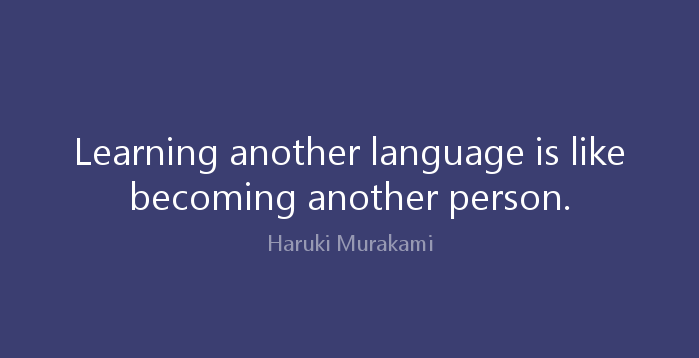This summer for me has been one of language learning and travel to foreign countries — an experience that continues to bring home for me the difficulties involved with human communication. It is hard enough to complete a shopping transaction in a foreign language let alone present a lecture or tell someone how I am doing. Even back home, I feel like my language lets me down and I remain less than fully understood by friends, colleagues, and business associates.
I am reminded in times like this that we often imagine a better self beyond our capacity to express. It is a more magnanimous self that embraces our loved ones with a more effortless grace; a more articulate self that expresses gratefulness better than our usual scripts. It is a wittier self that actually responds with the well-timed comeback rather than think of it on the drive home afterwards. Above all, it is a better-understood self that can somehow rise above the stilted limits of language and the variables of social interaction, and through it all, if it could just be perceived, gives shape to our real emotions, our true feelings, and hence, our so-imagined better selves.
But what good is this better self if no one ever sees it, hears it, or knows it? Perhaps even more fundamental (though slightly off-topic), is whether it is even worthwhile to speak of a self that perdures in isolation of social exchange and encounter (but let’s stick with the first question).
We imagine, says Rowan Williams,
“somewhere there are better tools, a speech in which we are more properly or honestly at home. But in fact the difficulty is not that experienced by two speakers, one or both of whom are working in an unfamiliar or problematic medium. The exchanges of conversation and negotiation are the essence of what is going on, not unsatisfactory translations of a more fundamental script.”[1]
We are who we communicate to others. We are left with what we have such as they are (our language, our shared scripts and speech acts, our groans and actions) to make ourselves known — frustrated as we are by the complexities of exchange and the nuances of non-verbal and verbal communication. Further complicating things is the self-absorbed nature of our would-be listeners who listen like most — selectively, distractedly, with their next thought queued up awaiting the speaker to finish. And so the challenges to being known persist, all the more with exceptional persons (e.g., our friends suffering from speech and behavioral divergences).
We, of course, prefer to believe otherwise — that who we are is buried beneath the social constructs and scripts. We prefer to believe that we are that more generous and charismatic self in our minds rather than in our actions. But that self is only the self-perception that remains firmly under our control, never fully realized in the world around. It is, of course, this desire to control self-perception that drives much of our activity on social media. We like to be regarded as our carefully curated selves portray. And yet, it is the oft-misunderstood self, the awkward side-hugging self, the inarticulate self that we really are more than we like to admit. Christian Bale, in his caped-crusading, gravel-tone has it fairly right: “It’s not who we are but what we do that defines us.”
None of this needs to be cause for dread (though it has been for some). We are not as terribly alone as some have feared. Nor must we simply wish our better selves to be made known. We can still, hard as it is, do what we must to be better. We can still, hard as it is, find ways of speaking truly. For Christians, the answer to the problem of true speech begins and ends with God. We strive not for transcendent speech, but speech that points to something that is truly transcendent — the type of speech the earliest Christians called testimony. It bears mentioning that the testimony of the earliest church, at least in my opinion, bears little resemblance to the type of evangelistic activity pervasive among many churches today. It bore witness to an impossibly gracious love, pointing to an uncontainable message of hope and reconciliation in the person of Jesus Christ. The church of the Bible overcomes not with power, nor with slick programs, nor by the popular vote, “but by the blood of the Lamb and the word of their testimony” (Rev. 12:11).
Hope remains for God’s people to be known as they really are. It is striking that the Apostle Paul makes it a point to stress that it is not so much that we know God that is of importance, but rather that we are known by him (1 Cor 8:3; Gal 4:8). God’s knowledge of us deserves reflection. We hide much and we tend not to think through what it means to be fully known in our best and our worst. It is simply not enough to wave the wand of imputation and continue on making a mess of things under the sanction of God’s love (too many Christians end up on this strange treadmill of sin and repentance as a result of such thinking). The way forward, it seems to me, must move closer to an appreciation of knowledge in the context of relationship. It is of profoundest importance to me that eternal life is characterized by the Evangelist as “knowing God” in the person of Jesus Christ (John 17:3).
And so, “For now we see in a mirror dimly, but then face to face. Now I know in part; then I shall know fully, even as I have been fully known.”
[1] Rowan D. Williams, “Interiority and Epiphany: A Reading in New Testament Ethics,” in Modern Theology 13:1 (1997), 30. The entire essay is well worth a read.





Leave a Reply
Your email is safe with us.